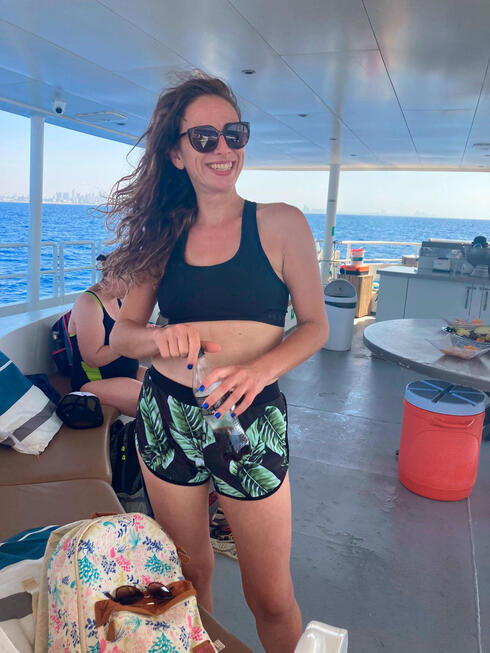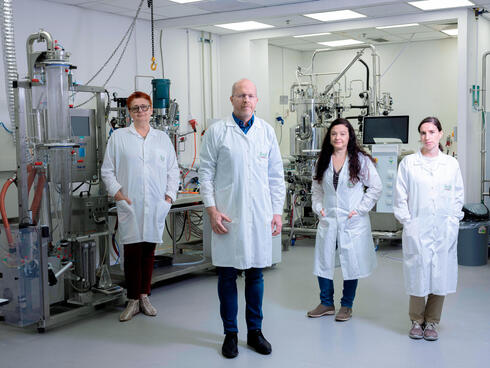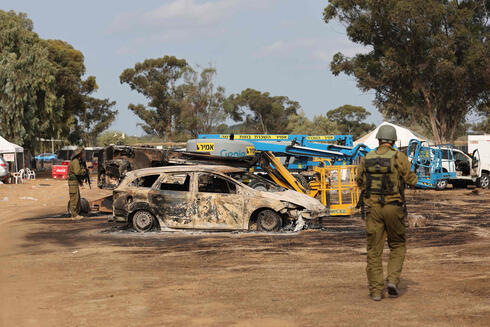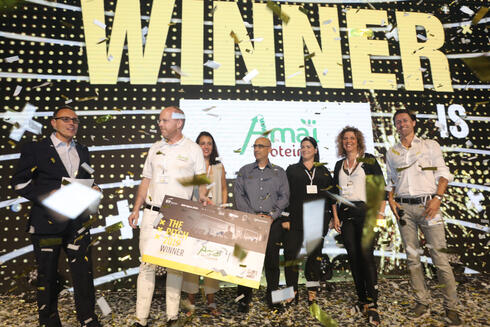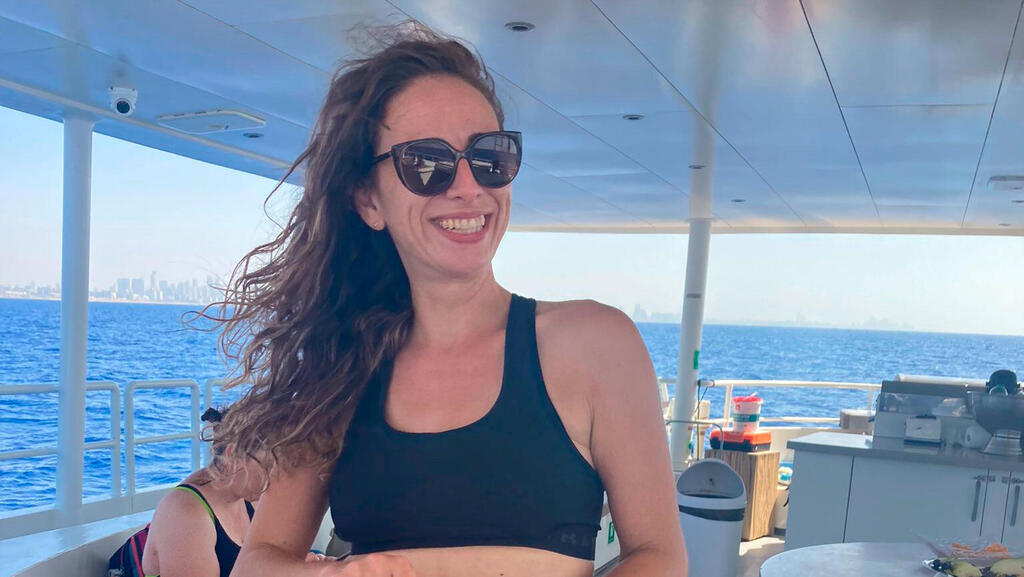
ISRAEL AT WAR
Israeli biotech startup Amai Proteins dealing with loss, grief, and uncertainty after murderous Hamas rampage
Following Hamas’ October 7th attack, Amai Proteins, which has only 32 employees, is navigating loss. Dr. Lilia Gurevich-Vasilkovsky, the head of the company’s molecular biology department, was murdered, three employees have kidnapped or murdered relatives, six were drafted to the IDF and three are parents of soldiers
At the entrance of the Rehovot office of biotech company Amai Proteins hangs a death notice for Dr. Lilia Gurevich-Vasilkovsky. The head of the company’s molecular biology department was murdered by Hamas terrorists at the Nova music festival near Kibbutz Reim. Only 38 years old and a recently divorced mother of six-year-old twins who had made significant effort to bring them into the world, Lilia was not an ordinary person.
She arrived at Amai in search of adventure in a small company. "She left a secure job at ADAMA for a startup," her father David says. "She didn’t want computers and paperwork, she said she needed a lab, experiments. After successful experiments at Amai, she would say to me, 'Dad, you don't understand the happiness of succeeding in an experiment, it's better than everything.'"
In the corner of her office, personal items she left behind will be gathered and passed on to her parents: a thermos, which she took with her four days a week from her home in Omer, a tired and worn knitted, blue scarf that once belonged to her beloved grandmother. Her co-workers still cannot bring themselves to pass by her desk.
Lilia was last heard from on Saturday at 8:45 am in a phone call where she said she was looking for a safe place to hide from the terrorists surrounding the area. She was killed, along with many others, by a grenade thrown into the bomb shelter where she was hiding.
"She loved science, always answering her children's questions about proteins with the utmost seriousness, but she also loved science fiction. 'Dr. Who,' 'The Lord of the Rings,' and 'Star Trek' were our common hobbies," her father says. "Not long ago, she took up pole dancing, set up a pole at home. She was an independent woman and a fighter, always fixing things with a wrench herself and sending me a happy photo. She always helped us with her two brothers who were born with severe disabilities. She was particularly close to her youngest brother.
Related articles:
"Lilia was a fighter. She was strong, with emotional and physical resilience, a person with such character, such determination. She had two brothers with severe disabilities, whom she cared for with her parents. She was special,” says VP People Anat Serber. “We loved her so much and believed in her so much that we made her a manager. She earned her doctorate while working here, but when we wanted to celebrate her, she didn't want the attention."
"Lilia was a colorful, lively figure, with wild curls," says CPO Yigal Gezundhait. "She did everything by herself. When I said 'no' to lab equipment she wanted, she didn't go to her boss for help, but directly made her case to me every morning. It was a waste of time to fight her, there was no such thing as 'no.' We had continuous interaction all the time, her office was the one I entered the most besides mine. But beyond that, she really was a central part of our company. She was the future of the company and isn’t an employee that can be replaced tomorrow. Her lab develops the strains that produce our protein. And the fruits of her work - the new proteins - we have only now begun to harvest. The future of the company was in her hands, and from a professional point of view it is a huge loss. This is without even mentioning the enormous social and emotional impact of her loss."
Comfort in solidarity
Amai - which means ‘sweet’ in Japanese - is an ambitious startup in the food tech industry that seeks to develop a sweet protein alternative to sugar. These days, it's also a microcosm of the current Israeli reality: a small company with only 32 permanent employees and about ten part-time students, many of whom were directly or indirectly affected by the carnage of Hamas’ October 7th attack on Israel.
Lilia is not the only loss Amai is dealing with. The company’s head of molecular biology Dr. Hagai Shmueli has a cousin, Ohad Yehalomi from Nir Oz, who was wounded and is still missing. His 12-year-old son, Eitan, was likely taken hostage to Gaza. Dr. Naama Kopelman, the Director of Computational Protein Design has two relatives from Kibbutz Be’eri who were taken hostage. Another employee has two relatives from Nahal Oz who were killed, leaving behind their 7-year-old daughter. On top of this, six of the company's employees were called up for reserve duty, and three employees have children drafted into combat.
Since Tuesday, all employees have been required to return to work in the office and labs, which has been very intense. But Amai cannot function remotely because it must operate its labs. "The yeast is our sweet protein production factory. We cultivate the protein in fermented yeast, similar to brewing beer," says Serber. "Yeast is alive. If you don't feed it, the whole process goes to waste. It needs to be fed regularly and its condition needs to be monitored."
The first version of Amai's product, a white powder that sweetens beverages and food, is in the final stages of reaching FDA approval. Other types of the protein, such as a heat-resistant strain, are in advanced development stages. "This is the essence of a biotech and food tech startup," explains Founder and CEO Ilan Samish. "A lot of our activities are lab-dependent: feeding yeast, adding DNA to it, protein cleaning and harvesting. These are not things that can be done from home. So, on October 7th, when all of the chaos broke out, Hagai Shmueli went to the office, and threw out some of the yeast."
"Not all employees actually need to return," says Serber, "but it's a matter of solidarity. Some employees can work from home, but in my opinion, in such a small company, it is impossible to let the people working in the lab be here alone. I think we can't allow there to be a feeling of different statuses between employees, as we learned from the COVID-19 pandemic, so, the policy is to return.
“You won't hear me say that a company is a family, because it's a misuse of the word 'family,' but there are friendships. There is solidarity and a network of relationships based on daily communication, and that’s a lot. These days, you can spend an hour in the kitchen chatting without feeling guilty. Being together is worth it."
‘I am privileged because I am okay’
Adi Zelig, who worked under Lilia, takes me to speak with Lilia's office mate, Bianca Gefen, the company’s head of analytics. "I can't handle going inside, I'll just show you the direction," she says to me. While everything appears to be normal at first glance, every conversation is an indicator of how emotionally overwhelmed the employees are.
"After two days at home, I was happy when they told us to return to work. It keeps your mind busy; how much can you remain alone with your thoughts?" says Gefen. "At the same party, the daughter of friends from Nir Oz was also killed," she says, before returning to discussing Lilia's murder. "She tried to escape in a car... They turned it in another direction... But then the terrorists threw a grenade at it," she says as her eyes fill with tears. "It reminds me of Babi Yar - a mass extermination, one grenade among the masses. And just like there, we know it from the few who survived. That's the history of our people."
Gezundhait also gets teary during our conversation. "I have a son drafted for reserve duty; I served in Tzuk Eitan (the 2014 Gaza War) along with him," he says. "Then there was a trend of soldiers calling their parents to say goodbye before their phones were taken away. There is nothing worse than the pressure after such a call from a son in war, especially when the war is in Gaza."
"Today, I was happy that the road was a bit crowded on the way here. I thought to myself that the world is getting back on track. The forces of life need to be stronger than those of death," says Dr. Kopelman. "I remind myself that, with all the emotion and pain I've experienced, I am actually privileged because I am okay. I hope those who are still alive will feel that their lives are worth living.
"As a result, I feel good being here at work, but I can't say that I was productive today. I do the easy tasks, reply to emails, or hold specific meetings. Even my friends in high-tech tell me that they can't work. Everyone is just going through the motions, hoping that the motivation will come.
"From time to time it gets to you," Kopelman continues. "When everyone is sitting in the kitchen, for example. Lilia was very striking, vocal, opinionated, intellectual, tall, beautiful, not one to keep her mouth shut. When we sit down to eat lunch together, you immediately feel her absence. There were several consecutive nights when I dreamt about her, and for me personally mornings are the hardest. You’ve just woken up, you still don't have defenses, and you need to build them slowly from scratch. There are other employees in the company who have also experienced disasters, but here there is a very specific void."
This void “creates all sorts of absurdities,” says Gefen. "Today, at 10:30, we held a regular meeting with five people and Lilia was one of them. At first the meeting was canceled because it's still too fresh to meet in such a small forum without Lilia. But then the person who organized it rescheduled the meeting and she was among the invitees. I told him that 'Lilia is still invited’ and he hadn’t even registered that he’d done that. These are things done automatically."
Many wounded souls
Amai Proteins has raised approximately $25 million to date, in addition to grants received from the state and international organizations. Last year, Amai won first place in the Extreme Tech Challenge competition, out of 2,000 competing startups. However, Samish knows that the medtech field is unpredictable, and the path to success is long.
In the last two weeks, he experienced an indescribable emotional rollercoaster, oscillating between joy and tragedy. Just a few days before the outbreak of the war, his daughter was born, and a few days after the conflict started, another daughter got married in Jerusalem. Meanwhile, he has a startup that needs to get back on track, and there's no time to wait for the wounds to heal. "We came home with the baby, without a secure space, and we keep hearing sirens," he recounts. "And then, on Shabbat, I heard that Lilia was missing. My first thought was, and it's terrible to say: 'What's worse - to be taken captive or to die?' It’s insane, but that's what went through my mind.
"At the same time, Hagai is wandering around ERs searching for his cousin without success. Another of our employees, Sally Kayuf, is pregnant and has gone to her family in the north with her two daughters and her husband, Ayub Kayuf, the first Druze commander of Shaldag (an elite air force unit). It's a crazy emotional rollercoaster, but nobody has a separation between the personal or the national anymore - the wall between them has fallen. I'm functioning on autopilot, and I feel like I'm living in a movie. There are so many wounded souls here, people sinking, people who are sad and can't function. I'm an entrepreneur, so my reaction is activity. Doing things calms me down.
“It's true that we needed the employees to return, but I also think, in principle, that it's good to return to routine as soon as possible. Therefore, we decided on a gentle return to normal, even if half of the people are not here because they're taking care of their children at home, or they can't get here physically. Every morning, I do a five-minute round to say good morning to the employees; today, it was two-hours," says Samish.
"Almost every employee knows someone who has experienced a personal tragedy. I held long conversations with Lilia's team. One of the workers only arrived today, and she was in distress. She mourned with me and with another worker who returned from the funeral of two of her relatives who were murdered. It just shows how critical solidarity is."
Samish mentions that the company relies on professional support. "We brought in emotional assistance, four social workers came to us from the Rehovot municipality because almost everyone has personally been impacted. Lilia's story shakes many people here. She ran the department for molecular biology, and aside from her boss, no one understands it. She was the center of knowledge - we relied on her. She also worked with external entities and constantly reads articles - sorry, she read. Now we need to think about what to do. One thing I do know is that the next protein we produce will be named after her."
The missing five points
Rosa and David went through days of uncertainty regarding the fate of their daughter, Lilia. Her phone went straight to voicemail, and until her death was confirmed there was a fear she might have been kidnapped. "Today, the Ramla police called to say they found her ring," says David, "My wife put it on and hasn't taken it off."
At Lilia’s funeral, David celebrated his daughter's achievements. A high school math teacher for 20 years in Omer, he taught generations of students. When his daughter scored 95 on an exam, David used to ask her, ‘Where are the missing five points?’
“It's silly Russian humor, which today I regret," he says. "We arrived as new immigrants in the 1990s with a culture of perfectionism. We demanded perhaps too much. I said in my eulogy how sorry I am and asked for forgiveness for not giving her enough praise and kind words, for not expressing how much we love her. We were tough, demanding Russian parents - everything had to be perfect.
"Lilia could be funny and annoying as well. She was very ambitious, always wanting to prove that she could succeed. She’d always say, “Don't worry, Mom and Dad, the Nobel is just ahead.'
"We both retired a year ago. Many students from all the years I’ve taught came to console us, bringing an endless amount of food. When we finish the seven days of mourning and get organized, we will donate what we received to soldiers in the Gaza envelope.
"Lillia left us two grandchildren, and our goal is to raise them alongside their father, Yair, as much as we can. With them, I won't complain about the missing five points. With them, it will be different."
